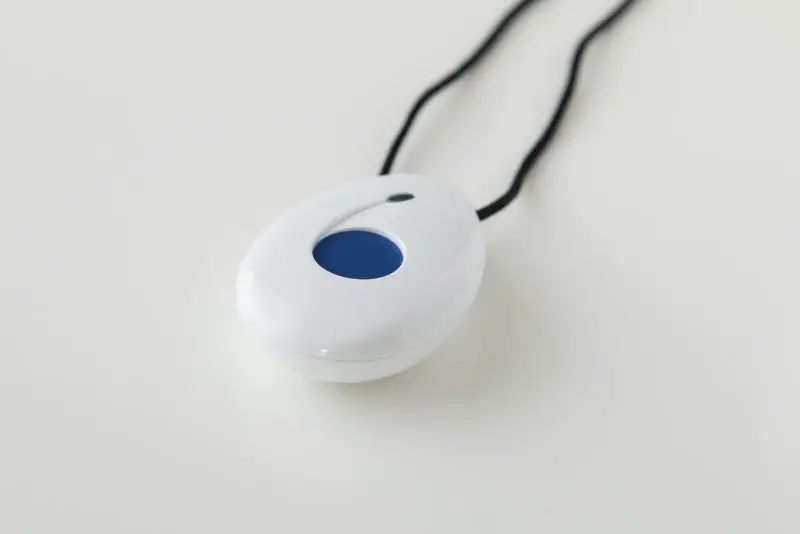Living alone can be a source of worry and concern for many seniors and their families. And for good reason! Seniors make up a high portion of emergency room visitors due to their heightened risk of injuries, falls, heart disease, and stroke.
Medical Alert Systems, also referred to as personal emergency response systems, are an excellent resource for seniors who value their safety and independence. These mini devices come with a button that instantly connects you to an emergency dispatcher in the event of a health emergency or other event that requires immediate response like a fire.
There are dozens of medical alert systems on the market that help families keep their loved ones safe. Some of the crucial factors to consider when you are shopping for one include:
Medical Guardian – Best Overall
- Battery life: 120 hours
- $30 to $80 a month for service
- Learn More
Phillips Lifeline – Best Ancillary Services
- Battery life: 2 to 7 days
- $29.95 – $49.95 a month for service
- $50 activation
- Learn More
GreatCall Lively – Fastest Response Time
- Battery life: 2 days to 4 months
- $24.99 to $39.99 month for service
- Learn More
We reviewed many of the most popular medical alert systems and here were our favorites:
Medical Guardian – Best Overall
Pros 👍
- Long battery life
- Free device
- No activation fee
Cons 👎
- Monthly cost
Medical Guardian provides two types of monitoring systems:
In-Home
The alert pendant can be worn around the neck as a necklace or around the wrist like a bracelet. After the button is pushed, a wireless signal is sent to the speaker to communicate with dispatch emergency or non-emergency services.
Since the majority of falls happen on slippery services like in the shower, the devices are water-resistant so they can be worn while taking a shower.
On-The-Go
The On-The-Go line of products provide systems that instead use a cellular network and have integrated GPS Location Tracking. All On-The-Go products are also water-resistant and can be worn either as a necklace pendant or bracelet.
Fall Detection
All Medical Guardian products except its Freedom Guardian watch are equipped with Fall Detection technology that automatically detects falls and triggers a call to the monitoring center even if you are unable to press the emergency button on your own.
Service Range
The In-Home products offer a range of 1,300 ft. of protection, while the On-The-Go products offer more mobility because they are designed to instead use a cellular connection.
Battery
Medical Guardian proudly states it has the longest battery life in the industry (for the capabilities they provide) at up to 120 hours on a single charge.
Cost
The products range from $30 to $80 a month, but many of the devices are provided at no cost with a $0 activation fee.
Get a Medical Guardian Alert →
Lifeline – Best Ancillary Services
Pros 👍
- No long-term contract
- Additional helpful suite of products (automatic medication dispensing device)
Cons 👎
- Activation and device fee
Similar to many of the other brands, Lifeline offers At-Home and On-The-Go options depending on the mobility of yourself or your loved one. All products are shower and water-resistant.
In-Home
Their HomeSafe Standard and HomeSafe with AutoAlert can be worn as a pendant. The HomeSafe Standard can also be worn as a wristband if that is more comfortable.
On-The-Go
Their GoSafe and GoSafe2 products are used with a cellular network and are worn as a pendant around the neck.
We selected Phillips as one of our top choices because of the other suite of products that come in the Phillips family of products includes their Automatic Medication Dispensing device.
The product helps users store medications and program medication schedules. The device promotes adherence by playing a reminder alert when it is time for the user to take their medication.
Fall Detection
All products except their at-home HomeSafe Standard product have AutoAlert Fall Detection technology.
Service Range
The At-Home products are as the name implies — only to be used within the home with a 500 feet service range. Their On-The-Go products are designed for more active seniors and can be used anywhere there is a cellular connection.
Battery
The HomeSafe products have a 48-hour backup battery, while the GoSafe and GoSafe2 products last 7 days and about 2 days, respectively.
Cost
The Lifeline is a bit on the pricey side with the at-home options ranging from $29.95 to $44.95 a month, with the mobile option priced at $49.95 a month. There is also a $50 activation fee for the at-home options and a $99.95 device fee for the on-the-go mobile option. However, unlike some other companies, the Lifeline does not require a long-term contract.
Lively – Fastest Response Time
Pros 👍
- Response time
- Additional services available (e.g. live nurse 24/7)
- No long-term contracts
Cons 👎
- Mobile Plus has a relatively short battery life
Lively’s claim-to-fame is having the industry’s fastest emergency response time.
One of our other favorite benefits of choosing as Lively as your medical alert vendor is its access to the additional benefits we outlined in our top choices for phones. Some of those benefits that can be coupled with their medical alert systems include:
Fall Detection
The Lively pendant automatically detects the sudden movement of a full. If you are unable to press the button on your own, the device automatically will call a 5Star agent you can speak to for help.
Urgent Care
Speak with a live nurse or doctor 24/7. You can even get prescriptions for common medication. No insurance plan or copay is necessary
Lively Link
Lively Link allows seniors and their family caregivers to receive emergency alerts, retrieve location, check the device status, and get caregiving support.
The two Medical Alert products Lively offers are Lively Mobile Plus and Lively Wearable2.
The Mobile Plus is an emergency pendant that can be worn around the neck or wrist with an emergency button that calls for help. The Wearable2 also has a help button, but also has other features like a step tracker that measures your daily steps to make sure you’re staying active.
Both products are waterproof so they can be worn while taking a shower or if you’re stuck outside in the rain.
Fall Detection
Both the Mobile Plus and Wearable2 have technology that can detect falls or sudden movements.
Service Range
The Mobile Plus includes enhanced GPS tracking, so the agent is able to locate you or your loved one if away from home.
Battery
The Mobile Plus has a battery life of 24 hours, while the Wearable2 has a battery life of up to 4 months.
Cost
Plans start at $24.99 a month for their Basic plan and go up to $39.99 for their Ultimate plan that includes additional features like urgent care, fall detection, and family caregiver support. The plans are not long-term contracts and there is no fee to cancel your plan. AARP members can also enjoy saving $60 a year on some plans.
Honorable Mentions
LifeAlert
Simple alert system
Bay Alarm Medical
Options for At-Home, On-the-Go, and In-the-Car
LifeStation
Small and sleek pendants
Medical Alert Systems are excellent advancements that have helped millions of seniors remain independent and able to stay in their own homes. They provide peace-of-mind by assuring you or your loved ones always someone with you by your side while at home, at the park, or at the grocery store.
How to choose a medical alert system for seniors?
Monitoring System
Some of the leading medical alert systems are connected to 24/7 dispatch centers that arrange services in the event of an emergency. Other systems directly alert friends or family members instead. Depending on the level of support you or your loved one is seeking, this is an important consideration in your decision. Those connected to dispatch systems, however, often charge a monthly fee and have contracts or minimum commitments.
Fall Detection
Falls are a leading cause of morbidity and disability in older adults: more than a third of people over 65 falls each year. Over the past few years, fall detection technology has significantly improved and is something to look for in an alert system if at all a concern.
Hidden Fees
While some devices just charge a standard fee for their physical devices, others charge activation fees and recurring charges for services like dispatch, GPS tracking, and fall detection. It’s critical to ask the sales representative for an itemized list of all immediate and ongoing fees.
Battery Life
Depending on the type of product you go with, the battery life can vary drastically. Some devices with more sophisticated fall detection technology require weekly charging, while the simple alert pendants have batteries that can last up to 10 years! If you anticipate regular charging to be a burden, the charging requirement should be a significant consideration.
Service Range
There are some alert systems that are coordinated with your home phone system, while others use a cellular network and GPS system. If you live in a house with a large yard or frequently leave the home, it might be best to specifically go with the systems that use cellular networks.
The simple waterproof watches and around-the-neck pendants we reviewed in this article hopefully should provide solace in cases of emergency like a fall, heart attack, or stroke.



